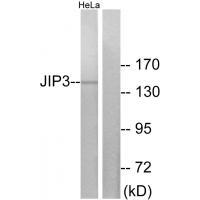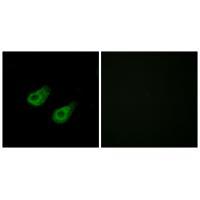

| WB | 咨询技术 | Human,Mouse,Rat |
| IF | 咨询技术 | Human,Mouse,Rat |
| IHC | 咨询技术 | Human,Mouse,Rat |
| ICC | 1/100-1/500 | Human,Mouse,Rat |
| FCM | 咨询技术 | Human,Mouse,Rat |
| Elisa | 咨询技术 | Human,Mouse,Rat |
| Aliases | C-jun-amino-terminal kinase interacting protein 3; JIP-3; JIP3; JNK MAP kinase scaffold protein 3; JNK-interacting protein 3 |
| Entrez GeneID | 23162; |
| WB Predicted band size | 147kDa |
| Host/Isotype | Rabbit IgG |
| Antibody Type | Primary antibody |
| Storage | Store at 4°C short term. Aliquot and store at -20°C long term. Avoid freeze/thaw cycles. |
| Species Reactivity | Human |
| Immunogen | Synthesized peptide derived from internal of human JIP3. |
| Formulation | Purified antibody in PBS with 0.05% sodium azide. |
+ +
以下是关于JIP3抗体的3篇参考文献,简要总结其研究内容:
1. **"JNK-interacting protein 3 (JIP3) regulates neuronal axonal transport through phosphorylation-dependent signaling"**
- **作者**: Matsuyama S, et al. (2003)
- **摘要**: 研究利用JIP3特异性抗体,通过免疫荧光和Western blot技术,揭示了JIP3在神经元轴突运输中的作用,发现其磷酸化状态影响与动力蛋白的相互作用,调控囊泡运输。
2. **"The c-Jun NH2-terminal kinase (JNK)-interacting protein-3 scaffold protein targets JNK to mitochondria via interaction with outer membrane proteins"**
- **作者**: Kelkar N, et al. (2000)
- **摘要**: 通过开发兔源多克隆JIP3抗体,作者证实JIP3作为支架蛋白介导JNK信号通路在线粒体外膜的定位,并参与细胞应激反应中的凋亡调控。
3. **"JIP3 mediates TrkB axonal anterograde transport and enhances BDNF signaling by directly bridging TrkB with kinesin-1"**
- **作者**: Huang SH, et al. (2011)
- **摘要**: 研究使用JIP3抗体进行免疫共沉淀实验,发现JIP3通过连接TrkB受体与驱动蛋白,促进脑源性神经营养因子(BDNF)信号在轴突中的传递,为神经发育机制提供新见解。
以上文献均通过JIP3抗体在蛋白定位、相互作用及功能研究中发挥关键作用,涉及神经运输、信号转导等领域。
The JIP3 (JNK-interacting protein 3) antibody is a tool used to detect and study JIP3. a scaffold protein encoded by the *MAPK8IP3* gene. JIP3 belongs to the JIP family, which regulates mitogen-activated protein kinase (MAPK) signaling pathways, particularly the c-Jun N-terminal kinase (JNK) cascade. JIP3 is highly expressed in the brain and plays critical roles in neuronal development, axonal transport, and stress response by mediating interactions between JNK kinases, upstream activators, and cargo molecules. It also interacts with motor proteins (e.g., dynein, kinesin) to regulate intracellular trafficking. Dysregulation of JIP3 is linked to neurodegenerative diseases (e.g., ALS, Charcot-Marie-Tooth) and cancer.
The JIP3 antibody is widely used in research to investigate protein expression, localization, and function via techniques like Western blot, immunohistochemistry, and immunofluorescence. It helps elucidate JIP3's role in signaling pathways, organelle transport, and disease mechanisms. Commercial JIP3 antibodies are typically raised against specific epitopes (e.g., human JIP3 N-terminal or C-terminal regions) and validated for cross-reactivity in various species. However, variability in antibody specificity requires careful experimental optimization. Recent studies also explore JIP3's involvement in autophagy and apoptosis, expanding its relevance in cellular stress adaptation and therapeutic targeting.
×